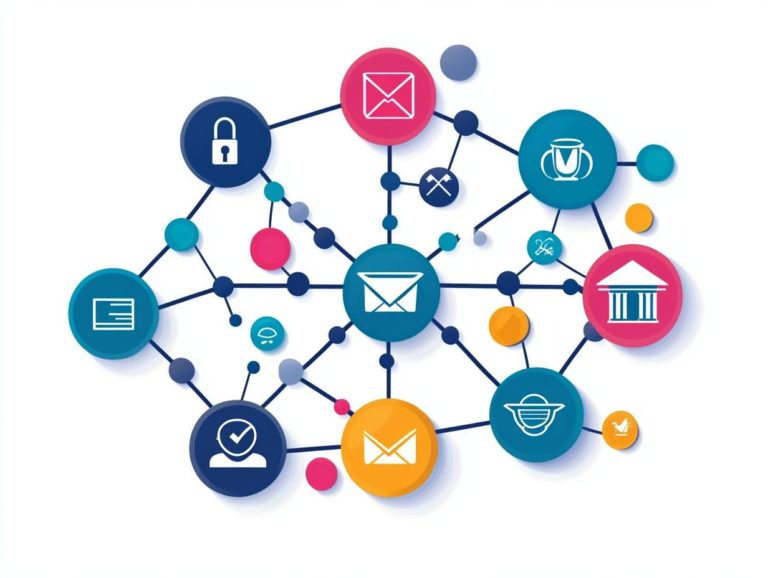Understanding Accreditation for Online Degrees
Accreditation is paramount in the realm of education, especially when it comes to online degrees. Think of it as your quality assurance stamp, guaranteeing that institutions uphold specific standards. The degrees they confer carry weight in the job market.
This article delves into what accreditation truly means and its vital purpose. It explores the various types available and explains why accreditation is significant for both students and employers.
You will find guidance on how to verify accreditation, a breakdown of the accreditation process, and a discussion on the importance of maintaining high accreditation standards.
Whether you’re contemplating an online degree or assessing potential candidates, grasping the concept of accreditation is essential for making well-informed decisions.
Contents
- Key Takeaways:
- What is Accreditation?
- Types of Accreditation
- Why Accreditation Matters for Online Degrees
- How to Verify Accreditation for Online Degrees
- The Process of Accreditation
- Maintaining Accreditation for Online Degrees
- Frequently Asked Questions
- What is accreditation for online degrees?
- Why is accreditation important for online degrees?
- Who grants accreditation for online degrees?
- How can I check if an online degree program is accredited?
- What are the different types of accreditation for online degrees?
- Can an online degree program be accredited by more than one agency?
Key Takeaways:

- Accreditation means that a school meets certain quality standards.
- Regional accreditation is typically considered more prestigious than national accreditation for online degrees.
- It is important to verify the accreditation of an online degree program to ensure its value and acceptance by employers.
- Resources like the U.S. Department of Education and the Council for Higher Education Accreditation can help in this process.
What is Accreditation?
Accreditation is a careful process wherein educational institutions and their degree programs undergo thorough evaluation against established quality standards set by independent agencies recognized by the U.S. Department of Education and the Council for Higher Education Accreditation.
This process ensures that institutions meet specific criteria that uphold educational integrity and enhance student outcomes. As you pursue your academic goals, accreditation provides the assurance that your degrees will hold value in the job market. This allows you to embark on your career path with confidence.
Definition and Purpose
The definition and purpose of accreditation center on evaluating educational institutions and programs to ensure they meet specific quality standards. This ultimately enhances the credibility of the degrees they offer.
This process reassures you as a student and potential employer. It also plays an important role in shaping the educational landscape. For degree seekers, especially those with aspirations for esteemed careers, attending an accredited institution signifies that you are receiving a rigorous education that aligns with current academic and industry standards.
Accreditation also significantly influences your financial aid options. Many funding opportunities are exclusively available to students enrolled in accredited programs. This crucial element of educational quality impacts everything from curriculum relevance to faculty qualifications. It is an essential consideration for anyone embarking on their academic journey.
Types of Accreditation
There are essentially two main types of accreditation: regional and national. Each serves distinct categories of educational institutions, ensuring that they adhere to diverse quality standards established by their respective accrediting bodies.
Regional vs. National Accreditation
Regional accreditation is often regarded as more prestigious than national accreditation. This is primarily because it typically applies to non-profit institutions that adhere to rigorous quality standards. In contrast, national accreditation is frequently linked to for-profit colleges and vocational schools.
This distinction carries substantial implications for you as a student pursuing further education. Attending a regionally accredited institution can result in greater acceptance of your transfer credits at other colleges and universities, making your academic journey notably smoother.
If you graduate from a nationally accredited institution, you may encounter hurdles when trying to transfer. Many regionally accredited schools may not recognize your credits.
This discrepancy also influences perceptions of quality. Regional accreditation is often seen as a benchmark of academic rigor, while national accreditation might suggest a focus more on specific vocational training than on a well-rounded education.
Why Accreditation Matters for Online Degrees

Accreditation is crucial for online degrees as it ensures that online schools provide a quality educational experience similar to traditional institutions, highlighting why accreditation matters for online degrees.
This focus on quality helps students succeed and significantly enhances job opportunities available to graduates.
Benefits for Students and Employers
Accreditation offers important advantages for you as a student and your potential employers. It guarantees that the educational institutions you choose provide quality education.
This commitment leads to better student outcomes and opens up a wider array of job opportunities upon graduation.
When you enroll in accredited programs, you gain access to enhanced learning experiences with a rigorous and relevant curriculum. This strong education helps you develop skills that are highly sought after in the job market, boosting your employability and preparing you to thrive in a changing landscape.
For employers, accreditation serves as a reliable indicator of educational quality, resulting in a more qualified workforce and reducing the risk of hiring unprepared candidates.
This relationship helps create a vibrant job market, where high standards of education benefit everyone involved.
How to Verify Accreditation for Online Degrees
Verifying the accreditation status of an online degree program is vital for you as a prospective student. You can easily do this by using various resources, such as accreditation databases and official agency websites that list recognized accrediting organizations.
This diligence ensures that you make informed decisions about your educational investments.
Resources and Red Flags to Look For
When verifying accreditation, it s essential to use reliable resources and be alert to red flags that might indicate issues with legitimacy. Look out for signs of diploma mills or unrecognized degrees.
Check out trusted organizations right away, like the U.S. Department of Education and the Council for Higher Education Accreditation. They maintain lists of legitimate institutions and their accredited programs, which are valuable tools in your search.
As you conduct your research, be cautious if a program makes bold claims about job placement, lacks transparency regarding its accreditation status, or pressures you for immediate enrollment. These are concerning signs.
If institutions are vague about their accreditation or do not provide easily accessible information about their accrediting organization, consider it a serious red flag. By knowing where to look and what to watch out for, you can make more informed and confident decisions regarding your education choices.
The Process of Accreditation
The accreditation process involves a thorough evaluation, where educational institutions participate in reviews designed to assess their compliance with quality standards set by accrediting organizations.
This often includes reviews by experts in the field, ensuring a high standard of quality and credibility in education.
Steps and Requirements for Accreditation

The journey to accreditation involves essential steps and requirements.
It typically begins with a self-assessment period, where you evaluate your programs against established accreditation criteria.
This is followed by submitting comprehensive documentation and undergoing a review process by experts in your field.
During the self-assessment period, you conduct a thorough assessment of your educational offerings, faculty qualifications, and overall institutional effectiveness.
This introspective process not only highlights your strengths but also uncovers areas that may need improvement. It reinforces your commitment to maintaining high educational standards.
Once this evaluation is complete, the submission of documentation serves as a clear snapshot of your institution s performance outcomes and strategic initiatives.
Peer reviews are crucial in this process, as external experts engage with your findings, providing valuable insights and constructive criticism that enhance the overall evaluation.
Together, these components uphold the integrity of educational practice, fostering an atmosphere of continuous improvement and accountability within your institution.
Maintaining Accreditation for Online Degrees
Maintaining accreditation for online degrees is vital for educational institutions.
It demands a commitment to quality standards and a dedication to continuous improvement.
You’ll need to navigate challenges such as evolving educational regulations and ensuring that faculty qualifications consistently meet accreditation expectations.
Challenges and Best Practices
One of the primary challenges in maintaining accreditation is keeping up with ever-evolving educational standards.
It s crucial for your institution to adopt best practices that ensure compliance and promote continual improvement in faculty qualifications and program offerings.
This challenge is further complicated by regulatory changes that can emerge unexpectedly. Your institution must remain vigilant and well-informed.
Resource allocation can also be a significant hurdle; many institutions find it difficult to balance their budgets while ensuring that adequate funds are dedicated to meeting accreditation criteria.
To navigate these complexities, consider the following strategies:
- Establish regular training sessions for faculty to keep them informed about compliance issues.
- Create a dedicated accreditation task force to oversee and uphold standards.
- Implement a proactive budgeting strategy that prioritizes accreditation-related needs.
By fostering a culture of accountability and continuous assessment, your institution can conquer these challenges and maintain its accreditation status.
Frequently Asked Questions
What is accreditation for online degrees?
Accreditation for online degrees is a process of evaluation by an external organization to determine if a school, program, or institution meets certain standards of quality and credibility, making it crucial to know what to look for in an accredited online program.
Why is accreditation important for online degrees?

Accreditation is important for online degrees because it ensures that the education provided meets industry standards and that the degree holds value and recognition among employers and other academic institutions. To learn more about this topic, check out what to know about online bachelor’s degree accreditation.
Who grants accreditation for online degrees?
Accreditation for online degrees is granted by independent accrediting agencies that specialize in evaluating distance education programs, making it crucial to grasp the concept of understanding accreditation in online learning.
How can I check if an online degree program is accredited?
You can check if an online degree program is accredited by visiting the website of the accrediting agency or by searching the database of accredited institutions provided by the U.S. Department of Education or the Council for Higher Education Accreditation.
What are the different types of accreditation for online degrees?
There are two types of accreditation for online degrees: institutional and programmatic.
Institutional accreditation evaluates the overall quality of the institution, while programmatic accreditation focuses on specific programs or schools within the institution.
Can an online degree program be accredited by more than one agency?
Yes, an online degree program can be accredited by multiple agencies. Some programs may have both institutional accreditation and specific program accreditation.
This means they meet high standards in various areas of study. It s great to know that your degree can be recognized by several organizations!






